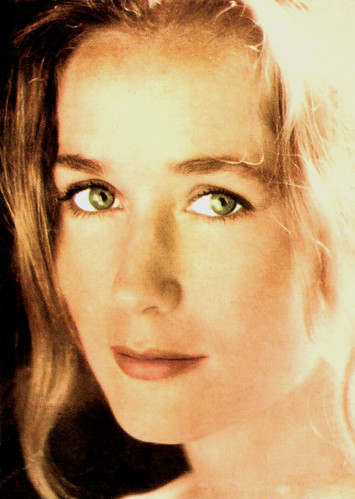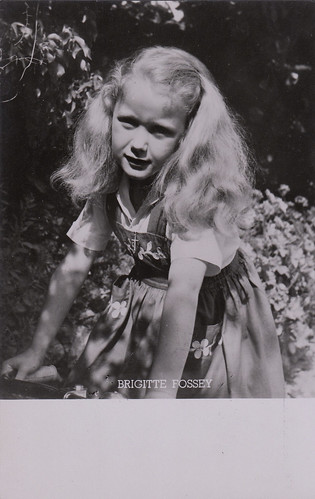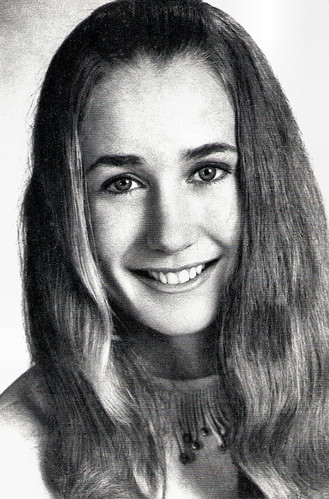French actress Brigitte Fossey (1946) made her first film when she was only five, the classic Jeux interdits/Forbidden Games (1952). As an adult, the lovely, sensitive-appearing blonde actress worked with such directors as François Truffaut, Bertrand Blier and Robert Altman.

Romanian postcard by Casa Filmului Acin, no. 667.
Brigitte Fossey was born in Tourcoing in the north of France in 1946. She was the daughter of Roger Fossey, a schoolteacher, and Marcelle Feuillade.
Fossey was five years old when she was cast by director René Clément to star in his war film, Jeux interdits/Forbidden Games (1952). After the shooting, she received a beautiful red bicycle as her wages.
Fossey played the role of Paulette, a little French girl who is orphaned in a Nazi air attack. She is befriended by the son of a poor farmer (Georges Poujouly), and together they try to come to terms with the realities of death. Mario Gauci calls it at IMDb: “One of the most poignant (and controversial) depictions of childhood innocence on film.”
While not initially successful in France, the film was a hit elsewhere. It won the Golden Lion at the Venice Film Festival, the Oscar for Best Foreign Language Film, and a BAFTA award. In Italy, she played the lead role in the drama La corda d'acciaio/The Steel Rope (Carlo Borghesio, 1953) with Fausto Tozzi and Virna Lisi.
Fossey was then hired by American actor/director Gene Kelly for his French-American comedy The Happy Road (1957) with Barbara Laage. It was filmed in the studios of Billancourt. When Fossey was ten years old her parents took her out of the film business so she could receive proper schooling. While completing her education, Fossey studied piano and dance and then went on to work briefly in Geneva, Switzerland as an interpreter and translator.

French or Belgian postcard, no. 353. Collection: Marlene Pilaete.

Romanian postcard by Casa Filmului Acin, no. 164.
Brigitte Fossey returned to Paris and studied acting at the Conservatory of Dramatic Art. In 1967, at the age of twenty, Fossey was offered the female lead by director Jean-Gabriel Albicocco for his film Le Grand Meaulnes/The Great Meaulnes based on Alain-Fournier's classic novel of young love.
After the popular success of this film, new proposals began to flow. Next, she appeared in the box-office hit Adieu l’ami/Farewell Friend (Jean Herman, 1968), starring Alain Delon and Charles Bronson. A cult success was the French comedy-drama Les Valseuses/Going Places (Bertrand Blier, 1974), starring Miou-Miou, Gérard Depardieu and Patrick Dewaere. Fossey played a supporting part. She also appeared in Blier’s sex comedy Calmos/Cool, Calm and Collected (Bertrand Blier, 1976) as the wife of Jean-Pierre Marielle.
One of her best-known films is Truffaut’s comedy/drama L'Homme qui aimait les femmes/The Man Who Loved Women (François Truffaut, 1977). She interpreted an editor, wise counsellor and ultimate conquest of Charles Denner.
Twice, she was nominated for a César Award. In 1977 for Best Actress a Supporting Role for Le Bon et les méchants/The Good and the Bad (Claude Lelouch, 1976), and in 1978 for Best Actress for Les Enfants du placard/Closet Children (Benoît Jacquot, 1977).
She also played opposite Helmut Griem in the West German crime film Die gläserne Zelle/The Glass Cell (Hans W. Geißendörfer, 1978). It was nominated for the Academy Award for Best Foreign Language Film. Fluent in English, Fossey has appeared in a few Hollywood movies. She played the wife of Paul Newman in the post-apocalyptic Science-Fiction film Quintet (Robert Altman, 1979).

Romanian postcard by Casa Filmului Acin. Collection: Alina Deaconu.

Romanian postcard by Casa Filmului Acin, no. 161. Brigitte Fossey in Le grand Meaulnes/The Grerat Meaulnes (Jean-Gabriel Albicocco, 1967). Collection: Alina Deaconu.

Romanian postcard by Casa Filmului Acin, no. 162. Brigitte Fossey in Le grand Meaulnes/The Great Meaulnes (Jean-Gabriel Albicocco, 1967). Collection: Alina Deaconu.
As an adult, Brigitte Fossey acted both on stage (in plays by Anton Chekhov and Molière), and on screen. Very successfully, she played Sophie Marceau’s modern and gentle mother in the film comedy La Boum/The Party (Claude Pinoteau, 1980) about a thirteen-year-old French girl finding her way at a new high school and coping with domestic problems. The film was an international box-office hit, earning 4,378,500 admissions in France.
Two years later, she returned in the equally successful sequel, La Boum 2 (Claude Pinoteau, 1982). Fossey also played a former drug addict opposite Patrick Dewaere in Un mauvais fils/A Bad Son (Claude Sautet, 1980) and had a supporting part in the biography Chanel Solitaire (George Kaczender, 1981) starring Marie-France Pisier and Timothy Dalton.
In 1982, she was a member of the jury at the 32nd Berlin International Film Festival. In Germany, she played with Robert Powell in the philosophical drama Imperativ/Imperative (Krzysztof Zanussi, 1982). She next starred in the drama Au nom de tous les miens/For Those I Loved (Robert Enrico, 1983) with Michael York as a Polish Jewish Holocaust survivor who emigrated to the USA in 1946.
She played a small part in the Italian drama Nuovo Cinema Paradiso/Cinema Paradiso (Giuseppe Tornatore, 1988), but for the shorter foreign release of the film, her scenes were cut. This international version won the Special Jury Prize at the 1989 Cannes Film Festival and the 1989 Best Foreign Language Film Oscar. In 2002, the director's cut 173-minute version was released including the scenes with Fossey.
In 1992, she co-starred with legendary Jean Marais in the adventure film Les Enfants du naufrageur/Shipwrecked Children (Jérôme Foulon, 1992). During the 1990s, she began performing in television productions and some of her series became very popular in France. Her most recent TV series is Jusqu'au dernier/Until the Last (François Velle, 2014). Brigitte Fossey was married from 1966 to 1980 to director Jean-François Adam, with whom she made the film M comme Mathieu/'M' as in Mathieu (1973). They have a daughter, actress Marie Adam.

French postcard by Editions Atlas, Evreux, no. 23. Photo: Telfrance. Marie-José Nat, Brigitte Fossey and Marie-France Pisier in the TV series Les Gens de Mogador/The people of Mogador (Robert Mazoyer, 1972).

French postcard by Editions Atlas, Evreux, no. 47. Photo: Jacques Morell / Kipa / Corbis. Brigitte Fossey and Jacques Perrin in Le Château des Oliviers/The Oliviers Castle (Nicholas Gessner, 1993).
Trailer for Jeux interdits/Forbidden Games (1952). Source: Rialto Film (YouTube).
Source: Yvan Foucart (L’encinémathèque – French), Brigitte Baronnet (AlloCiné – French), Wikipedia, and IMDb.
This post was last updated on 3 April 2024.

Romanian postcard by Casa Filmului Acin, no. 667.
Forbidden games
Brigitte Fossey was born in Tourcoing in the north of France in 1946. She was the daughter of Roger Fossey, a schoolteacher, and Marcelle Feuillade.
Fossey was five years old when she was cast by director René Clément to star in his war film, Jeux interdits/Forbidden Games (1952). After the shooting, she received a beautiful red bicycle as her wages.
Fossey played the role of Paulette, a little French girl who is orphaned in a Nazi air attack. She is befriended by the son of a poor farmer (Georges Poujouly), and together they try to come to terms with the realities of death. Mario Gauci calls it at IMDb: “One of the most poignant (and controversial) depictions of childhood innocence on film.”
While not initially successful in France, the film was a hit elsewhere. It won the Golden Lion at the Venice Film Festival, the Oscar for Best Foreign Language Film, and a BAFTA award. In Italy, she played the lead role in the drama La corda d'acciaio/The Steel Rope (Carlo Borghesio, 1953) with Fausto Tozzi and Virna Lisi.
Fossey was then hired by American actor/director Gene Kelly for his French-American comedy The Happy Road (1957) with Barbara Laage. It was filmed in the studios of Billancourt. When Fossey was ten years old her parents took her out of the film business so she could receive proper schooling. While completing her education, Fossey studied piano and dance and then went on to work briefly in Geneva, Switzerland as an interpreter and translator.

French or Belgian postcard, no. 353. Collection: Marlene Pilaete.

Romanian postcard by Casa Filmului Acin, no. 164.
Les valseuses
Brigitte Fossey returned to Paris and studied acting at the Conservatory of Dramatic Art. In 1967, at the age of twenty, Fossey was offered the female lead by director Jean-Gabriel Albicocco for his film Le Grand Meaulnes/The Great Meaulnes based on Alain-Fournier's classic novel of young love.
After the popular success of this film, new proposals began to flow. Next, she appeared in the box-office hit Adieu l’ami/Farewell Friend (Jean Herman, 1968), starring Alain Delon and Charles Bronson. A cult success was the French comedy-drama Les Valseuses/Going Places (Bertrand Blier, 1974), starring Miou-Miou, Gérard Depardieu and Patrick Dewaere. Fossey played a supporting part. She also appeared in Blier’s sex comedy Calmos/Cool, Calm and Collected (Bertrand Blier, 1976) as the wife of Jean-Pierre Marielle.
One of her best-known films is Truffaut’s comedy/drama L'Homme qui aimait les femmes/The Man Who Loved Women (François Truffaut, 1977). She interpreted an editor, wise counsellor and ultimate conquest of Charles Denner.
Twice, she was nominated for a César Award. In 1977 for Best Actress a Supporting Role for Le Bon et les méchants/The Good and the Bad (Claude Lelouch, 1976), and in 1978 for Best Actress for Les Enfants du placard/Closet Children (Benoît Jacquot, 1977).
She also played opposite Helmut Griem in the West German crime film Die gläserne Zelle/The Glass Cell (Hans W. Geißendörfer, 1978). It was nominated for the Academy Award for Best Foreign Language Film. Fluent in English, Fossey has appeared in a few Hollywood movies. She played the wife of Paul Newman in the post-apocalyptic Science-Fiction film Quintet (Robert Altman, 1979).

Romanian postcard by Casa Filmului Acin. Collection: Alina Deaconu.

Romanian postcard by Casa Filmului Acin, no. 161. Brigitte Fossey in Le grand Meaulnes/The Grerat Meaulnes (Jean-Gabriel Albicocco, 1967). Collection: Alina Deaconu.

Romanian postcard by Casa Filmului Acin, no. 162. Brigitte Fossey in Le grand Meaulnes/The Great Meaulnes (Jean-Gabriel Albicocco, 1967). Collection: Alina Deaconu.
Cinema Paradiso
As an adult, Brigitte Fossey acted both on stage (in plays by Anton Chekhov and Molière), and on screen. Very successfully, she played Sophie Marceau’s modern and gentle mother in the film comedy La Boum/The Party (Claude Pinoteau, 1980) about a thirteen-year-old French girl finding her way at a new high school and coping with domestic problems. The film was an international box-office hit, earning 4,378,500 admissions in France.
Two years later, she returned in the equally successful sequel, La Boum 2 (Claude Pinoteau, 1982). Fossey also played a former drug addict opposite Patrick Dewaere in Un mauvais fils/A Bad Son (Claude Sautet, 1980) and had a supporting part in the biography Chanel Solitaire (George Kaczender, 1981) starring Marie-France Pisier and Timothy Dalton.
In 1982, she was a member of the jury at the 32nd Berlin International Film Festival. In Germany, she played with Robert Powell in the philosophical drama Imperativ/Imperative (Krzysztof Zanussi, 1982). She next starred in the drama Au nom de tous les miens/For Those I Loved (Robert Enrico, 1983) with Michael York as a Polish Jewish Holocaust survivor who emigrated to the USA in 1946.
She played a small part in the Italian drama Nuovo Cinema Paradiso/Cinema Paradiso (Giuseppe Tornatore, 1988), but for the shorter foreign release of the film, her scenes were cut. This international version won the Special Jury Prize at the 1989 Cannes Film Festival and the 1989 Best Foreign Language Film Oscar. In 2002, the director's cut 173-minute version was released including the scenes with Fossey.
In 1992, she co-starred with legendary Jean Marais in the adventure film Les Enfants du naufrageur/Shipwrecked Children (Jérôme Foulon, 1992). During the 1990s, she began performing in television productions and some of her series became very popular in France. Her most recent TV series is Jusqu'au dernier/Until the Last (François Velle, 2014). Brigitte Fossey was married from 1966 to 1980 to director Jean-François Adam, with whom she made the film M comme Mathieu/'M' as in Mathieu (1973). They have a daughter, actress Marie Adam.

French postcard by Editions Atlas, Evreux, no. 23. Photo: Telfrance. Marie-José Nat, Brigitte Fossey and Marie-France Pisier in the TV series Les Gens de Mogador/The people of Mogador (Robert Mazoyer, 1972).

French postcard by Editions Atlas, Evreux, no. 47. Photo: Jacques Morell / Kipa / Corbis. Brigitte Fossey and Jacques Perrin in Le Château des Oliviers/The Oliviers Castle (Nicholas Gessner, 1993).
Trailer for Jeux interdits/Forbidden Games (1952). Source: Rialto Film (YouTube).
Source: Yvan Foucart (L’encinémathèque – French), Brigitte Baronnet (AlloCiné – French), Wikipedia, and IMDb.
This post was last updated on 3 April 2024.
What an interesting filmography! Many memorable and important films.
ReplyDelete